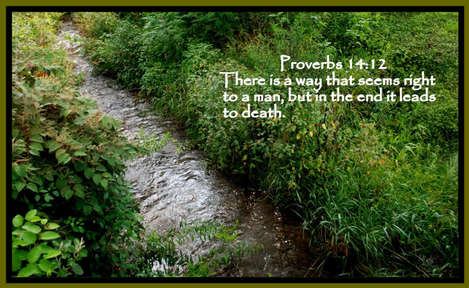The Book of Proverbs

The Hebrew translated "proverb" is also translated "taunt" (Isaiah 14:4), "discourse" (Numbers 23:7,18) and "parable" (Ezekial 17:2), so its meaning is considerably broader than the English term. Most proverbs are short, compact statements that express a truth about human behavior. A common feature of the proverbs is the use of figurative language. Since Solomon has a prominent role in the book, most of Proverbs would stem from the tenth century B.C. and Israel's united kingdom. According to the prologue (1:7) , Proverbs was written to give "prudence to the naive, to the youth knowledge and discretion" (1:4), and to make the wise wiser (1:5). Acquiring wisdom and knowing how to avoid the pitfalls of folly will lead to health and success. Although Proverbs is a practical book dealing with the art of living, it bases wisdom solidly on the fear of the Lord (1:7).
In chapters 1-9, Solomon writes about wisdom for younger people. He speaks of details of Godly living and heeding a parent’s advice, “The fear of the LORD is the beginning of knowledge” (1:7). Salvation is through faith and trust in Jesus Christ alone and Proverbs directly teaches us to, “Trust in the LORD with all your heart and do not lean on your own understanding. In all your ways acknowledge Him, And He will make your paths straight” (3:5-6).
In chapters 1-9, Solomon writes about wisdom for younger people. He speaks of details of Godly living and heeding a parent’s advice, “The fear of the LORD is the beginning of knowledge” (1:7). Salvation is through faith and trust in Jesus Christ alone and Proverbs directly teaches us to, “Trust in the LORD with all your heart and do not lean on your own understanding. In all your ways acknowledge Him, And He will make your paths straight” (3:5-6).

In chapters 10-24, there is wisdom that applies to average people covering various topics. Many of these parables contrast a righteous man and a wicked
man, and urges us to commit our way to God, “There is a way which seems right to a man, but its end is the way of death” (14:12).
man, and urges us to commit our way to God, “There is a way which seems right to a man, but its end is the way of death” (14:12).

Chapters 25-31, give wisdom to leaders. It was these very proverbs that were transcribed by King Hezekiah’s people, and for good reason (25:1). They contain many warnings and instructions to assist in walking and seeking a Godly life. As would be understood by a leader of an army, Solomon writes in 27:17, “Iron sharpens iron, so one man sharpens another.”
Foreshadowing of Jesus
Wisdom & God's Way

The theme of wisdom and its necessity in our lives finds its fulfillment in Christ. We are continually exhorted in Proverbs to seek wisdom, get wisdom, and understand wisdom. Proverbs also tells us—and repeats it— that the fear of the Lord is the beginning of wisdom (1:7; 9:10).
Our fear of the Lord’s wrath and justice is what drives us to Christ,
who is the embodiment of God’s wisdom as expressed in His glorious plan of redemption for mankind. In Christ, “in whom are hidden all the treasures of wisdom and knowledge” (Colossians 2:3), we find the answer to our search for wisdom, the remedy for our fear of God, and the “righteousness, holiness and redemption” that we so desperately
need (1 Corinthians 1:30). The wisdom that is found only in Christ is in
contrast to the foolishness of the world which encourages us to be wise in our own eyes. But Proverbs also tells us that the world’s way is not God’s way (Proverbs 3:7) and leads only to death (Proverbs 14:12; 16:25).
Our fear of the Lord’s wrath and justice is what drives us to Christ,
who is the embodiment of God’s wisdom as expressed in His glorious plan of redemption for mankind. In Christ, “in whom are hidden all the treasures of wisdom and knowledge” (Colossians 2:3), we find the answer to our search for wisdom, the remedy for our fear of God, and the “righteousness, holiness and redemption” that we so desperately
need (1 Corinthians 1:30). The wisdom that is found only in Christ is in
contrast to the foolishness of the world which encourages us to be wise in our own eyes. But Proverbs also tells us that the world’s way is not God’s way (Proverbs 3:7) and leads only to death (Proverbs 14:12; 16:25).
continue to Ecclesiastes...
